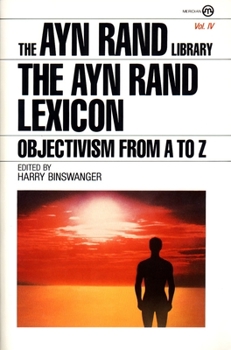The Ayn Rand Lexicon: Objectivism from A to Z (Ayn Rand Library)
(Book #4 in the The Ayn Rand Library Series)
Select Format
Select Condition 
Book Overview
Customer Reviews
Rated 5 starsDifficult but rewarding
Since I am neither philosopher nor student of philosophy, I am not qualified to comment on this book for those perspectives. I am at best an interested and educated layman who read it without benefit of teacher or class, and so I shall address the work from that persective, which may be useful to others similarly situated.Professor Audi here presents theories of knowledge organized by sources and structure, rather that...
1Report
Rated 5 starsAnother winner from Routledge.
Robert Audi's _Epistemology: A Contemporary Introduction to the Theory of Knowledge_, is another fine entry in the Routledge Contemporary Introductions to Philosophy series. In this one, a leading epistemologist presents an excellent and accessible overview of the philosophy of knowledge.The text is helpfully divided into three major subtopics.In the first, "Sources of knowledge, justification, and truth," Audi devotes...
0Report



































![Hotel (Volume#2) [Japanese Edition]](https://m.media-amazon.com/images/I/51-FGxrtilL._SL200_.jpg)








